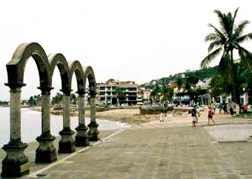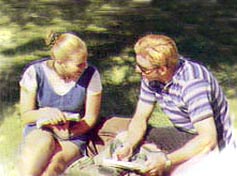|
Program & Admission Information - Puerto Vallarta, Mexico
|
|
|
|
|
| |
|
|
| |
|

Learning is based on the Communicative Approach, without losing sight of the need for grammatical accuracy. Spanish language courses are taught in Spanish and are designed to help students acquire fluency and sufficient communicative skills to cope with any situation that they are likely to encounter.
On arrival, students are tested for both written and spoken competence. On the basis of this placement test, they are assigned to the most appropriate level for their own benefit. Groups can be opened with a minimum of three students.
The school has divided their Group program into four levels:
* Level I. Beginning
This level is for those students who have had no previous experience with Spanish. During this course the student will learn simple forms of communication: greeting people, introducing oneself, replying to a greeting, asking for and telling time, identifying objects and places, asking for and giving information about the family, home, food, etc., expressing feelings, talking on the phone, physically describing people and state of health, asking for and giving prices, colors, and materials. Also, the student will learn the three forms of conjugation in the present tense, with regular verbs as well as the most commonly used irregular verbs. In addition, uses of SER, ESTAR, TENER and HABER will be learned. Beginners can also enroll in Content Courses taught in English (see below).
* Level II. Intermediate
The student will learn how to carry on a cordial and informative conversation with others. He/she will be able to describe people, things, and places as well as express opinions, make suggestions and denials in different situations. Upon finishing the course the student will be able to better express him/herself using present tense construction, wordy explanations in the future, past and imperfect tenses, and therefore be able to talk about past events. Intermediate students may enroll in the Supplementary Conversation I course and Content Courses (see below).
* Level III. High Intermediate
The student will be capable of expressing ideas in the formal future tense, as well as use these forms to express probability in the present and past tenses. He/she will express emotions and opinions and use phrases of courtesy in order to ask for items, give apologies, and turn down offers, suggestions, etc. The student will be able to express moral obligation, give advice and suggestions and will learn the most common ways of giving orders. He/she will also improve their use of reciprocal and reflexive verbs. High Intermediate students may enroll in the Supplementary Conversation II course and Content Courses (see below).
* Level IV. Advanced
Advanced classes concentrate on total mastery of the language, including reading excerpts from literature, the writing of essays and enhancement of oral expression. Advanced students can enroll in any Supplementary or Content Courses, according to their needs.
|
|
|
|
|
|
|
Private classes
If you wish to take a course that follows a different pace from the standard courses available, you make take advantage of these individually tailored courses. Students may take private classes only, or as a supplement to regular courses, depending on their needs. Private classes may be programmed at any time and last as long as required. Each tutor will design an individual program that most fits the needs of the individual so as to help her or him acquire mastery of Spanish.
|
|
|
|
|
Basic Spanish for tourists:
This program is designed to give basic survival skills to those who are staying in Mexico for short periods of time. Students will learn a series of useful phrases and common vocabulary for communication both inside and outside the classroom.
|
|
|
|
| |
|
|
| |
|

These courses are at additional cost.
* Conversation I
(For those students who have tested into Level II)
In this course the student will practice basic sentences and phrases in communication: introducing oneself and others, asking for help, asking for or giving information regarding the location of places, expressing desire and illness, and learning expressions that can be used in restaurants, banks, supermarkets, etc. There will be preparation and presentation of themes relating to the family, the city, leisure activities, as well as others related to daily life.
* Conversation II
(For those students who have tested into Level III)
The student will develop the ability to communicate in order to participate in the daily life in Mexico and to relate to specific social situations. Furthermore, he/she will participate in activities that promote ideas, expression of opinion, discussions, expression of agreements and disagreements, and questioning or answering, with respect to themes of interest. The dynamics of the class will include different techniques, such as debates, brainstorms, group problem-solving, panels, interviews, oral reports, etc.
|
|
|
|
|
|
| |
|
|
| |
The school gives content courses in English or Spanish, according to group needs. The sessions last two hours per day for two weeks. These courses are at additional cost and are held only in the summer.
* The History of Modern Mexico
Students will attend lectures on the history of Mexico from the War of Independence, through the Revolution and on to the industrialization of the 40's and its effects on public, private and agrarian sectors. In addition, the course will focus on popular movements, political parties, and the unions in the past two decades. Finally, there will be an overview of the political scene in Mexico.
* Mexican Culture
This course will afford the student an overall view of Mexican culture from an anthropological standpoint. Religion and national values will be considered within the Mexican context.
|
|
|
|
|
|
| |
|
|
| |
Friendship Program:
This program enables foreign students to get to know Mexican students so as to practice Spanish and participate in cultural exchange.
|
|
|
|
|
|
| |
|
Admissions & Academic Credit
|
|
|
| |
|
|
| |
Students age 18 years and older are welcomed regardless of educational background, occupation or nationality. No previous knowledge of Spanish is required except where otherwise indicated.
Students desiring credit for their study at Escuela de Espanol UG should contact their home school or request the NRCSA Credit Fact Sheet. Generally, U.S. universities consider 15 hours of study to be equal to 1 semester credit.
|
|
|
|
|
|
|
|
|
|
|

